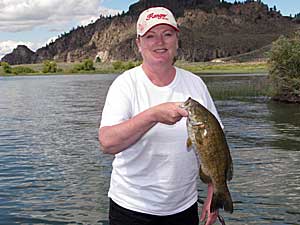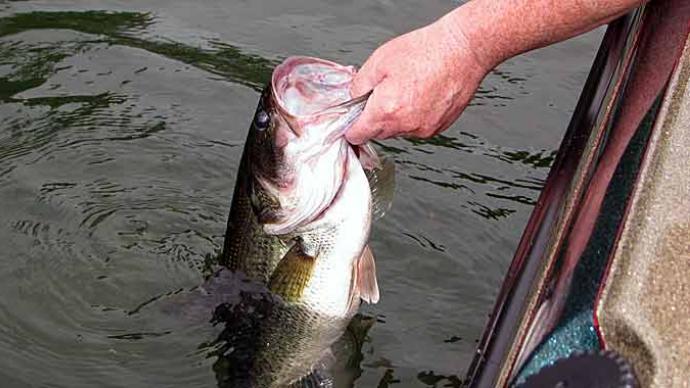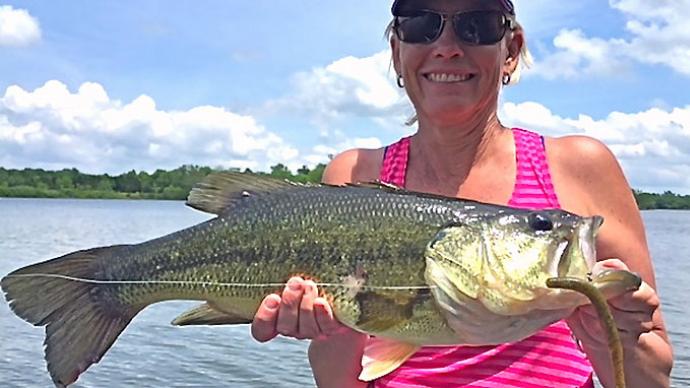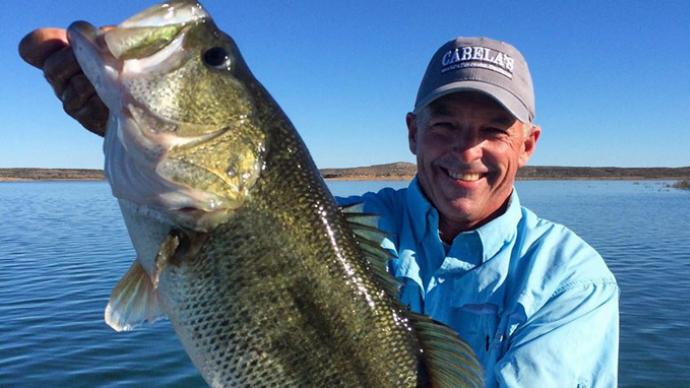
Approaching a new lake is like going on a date with a new girlfriend. You think you know what to expect, but you can be pleasantly or unpleasantly surprised by the outcome. Most of the time, your attitude and approach will determine the outcome.
Fishing being fishing, and although luck can always factor into the equation, in my experience, it seems that the anglers who put in the most time and preparation when going to a new lake have the best results. Just remember, in bass fishing, few things are set in stone.
The best way to learn about a new lake is to go there and fish with someone who already knows the lake. This person should be someone who fishes the lake regularly with at least some ability to find and catch fish. If you are pre-fishing for a tournament, the person you are getting information from should also be someone you can trust. It should also be someone who will not be fishing with all your competing friends. This person might be a friend or an acquaintance. In any case, you should shoulder expenses for the day.
| You should still put in some time searching for fish on your own. Don't just count on fishing areas shown to you by someone else. |
Not everyone has the luxury of knowing someone at every lake they may fish, but even if you do, you should spend time searching for fish on your own. A good friend would probably give you their secret holes, but we've all seen out-of-towners come in and stroke the locals. So you can't necessarily just count on their holes.
Being a guide myself, I recommend hiring a guide at a new lake. In most cases, this can work very well. You can quickly be shown areas of the lake that hold fish and, more importantly, how to run the lake safely. Always be up-front with the guide. Let them know you will be fishing the lake for several days or are pre-fishing for a tournament. Being honest and up-front is far more rewarding to you both. All my trips are strictly catch-and-release, so I screen my clients.
Guides work all year, keeping in touch with their fish. I've had whole areas decimated after a guide trip with clients who returned to the areas where I took them and kept and filleted their catch for several days afterward. If you tell the guide you will release the fish you catch, do what you say you will do. Guides work too hard to stay on fish to have them all just fill someone's freezer. I now have some ex-clients who probably wonder why I'm always booked when they call.
Another thing to remember is that most guides fish with people who are probably less experienced than a tournament competitor. Therefore, by fishing with them, you are more than likely being exposed to some fish that are smaller and easier to catch rather than larger, harder-to-catch fish.
Always, and I repeat - always, purchase a map of the lake you will fish. You might even want several different versions of lake maps if they are available. Nowadays, there are maps for most lakes of any size, but there may not be any commercial maps of some of the smaller bodies of water.
If a good quality, accurate commercial map of the lake is not available, an alternative is to purchase a US Geological Survey (USGS) map of the lake area before it was impounded. These maps are incredibly accurate, but you do have to draw in the water line and the dam. Remember that none of the features surrounding the lake will be included in this map. If the lake was constructed after the survey date, you might get some essential details omitted from commercial models.
USGS maps can usually be found at larger map stores, but if they do not have them, they can often order them for you. One note, though, these are very large maps (can be) if you order the whole thing. Sometimes all you'll need will be one section of an area. You'll just have to talk to the salesperson to determine which areas you need.
If you are pre-fishing for a tournament and it is allowed in the rules, you should always talk to people at the local bait and tackle shops or marinas. Most of these folks want you to do well because if you catch a lot of fish, you're more likely to return to their place of business and buy more of their wares. Keep in mind they will tell everyone who visits their shop and everyone they know about it, so expect some company if you fish the areas they tell you about. Sometimes, though, using a different lure or technique than they tell you about in the same areas can be a gold mine.
On a small lake, you can look the whole lake over in a few hours. However, a different approach is needed on a large lake or reservoir.
Studying the maps you have purchased can save you a lot of time on larger bodies of water. Bass, being bass anywhere you go, will to a degree, dictate your approach simply by following their seasonal patterns. You know what they should be doing. But, for instance, not all bass on a given body of water will do the same thing simultaneously. Spawning occurs in various stages in our lakes, as do similar migrational moves.
Try separating larger lakes into one-third sections or even fourths (quadrants). Then, depending on your available time to be on the lake, fish each section thoroughly. If your time is limited, select one section and concentrate on it.
Since moving to Falcon (Texas), I can honestly say that a fisherman would never have to leave the area referred to as the Tigers and would stand as good a chance as everyone else entered a tournament to win. Veach Basin on Sam Rayburn and Six Mile at Toledo Bend are the same types of areas. Of course, as mentioned before, you'll have lots of company in such areas, but try different things from what others are doing, and you might be surprised. These types of areas hold fish for many reasons. You only need to remember that they hold fish that can be caught. If you have time, try at least one other lake section. This gives you a backup location to fish should your chosen one not produce as expected.
Although I have never hired a pilot to fly over a lake, several friends have done so over Falcon. They take rolls of pictures of excellent structure that is exposed during low-water conditions. They have found pockets of clear water in areas surrounded by muddy water. A person in a boat might move on, assuming these areas did not exist, as they approached a muddy area.
One of the best ways to make the most of scouting trips is to combine your efforts with others. Almost all anglers who fish tournaments have other anglers they travel with, room with, etc. The most effective way to gather information involves one or two other boats in the "hunt." Sections of the lake can be utilized by separate boats, and information can be shared among all. In other instances gathering information from one location or section together can also be helpful.
| Don't overlook your "gut instincts" when it comes to fishing. |
Even though I am separated from my brothers by more than 500 miles, we fish the Texas State Bass Tournament yearly and one or two of the open events held at Falcon. There'll generally be at least two boats of us, sometimes three.
Say we enter a large creek. One boat will fish shallow, the other deep. For example, one might fish the grass while the other tries hardwoods and willows. If we fish the same type of structure or cover, we try different baits to refine the pattern. Two-way radios relay information such as bait color, depth fish are caught, etc., to the other boats.
All of your senses must play a part in fishing a new lake successfully. In most cases, the lake bottom will be at least similar to features you can see above the water line. The simple sight has led to many great fishing holes. Birds such as egrets and herons spotted on a windy bank or in the back of a cove should alert you to the presence of fish. They earn their living by fishing. Their prey is the same prey that the fish you seek is looking for. The big splash you heard, but didn't see, might not have been a carp. The distinct smell of fish could be a school of bass-killing shad just below the surface where you can't see them.
Don't overlook your "gut instincts" when it comes to fishing. I firmly believe in the sixth sense and will sometimes fish a spot just because it looks good.
Supplementing your instincts and what you know with modern conveniences such as binoculars might prove invaluable. A GPS unit could save the day. Your "underwater eyes" (depthfinders and graphs) must be monitored constantly if you plan to be competitive.
Fishing a new lake is like going out on a first date. It can be pleasant or not. It takes proper and complete preparation to increase your odds of a pleasant experience.




